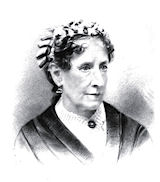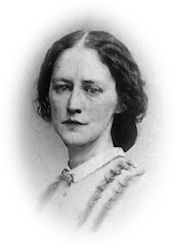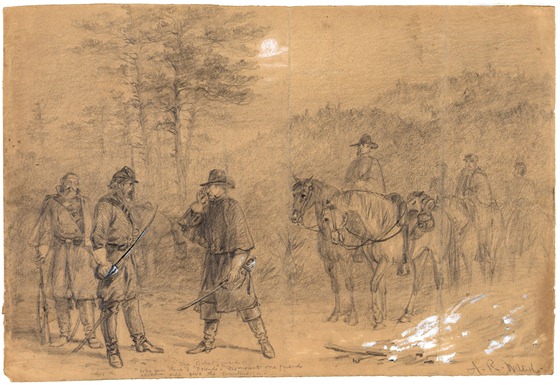24 West 31st Street,
Sunday, Jan. 4th, 1863.
My own dear Son:
I went to hear Mr. Prentiss this morning, and was deeply affected and impressed by his New Year’s sermon. Thomas and Lilly having gone to church this afternoon, I take advantage of this quiet hour to write a few words to you. We are anxiously awaiting the final result of the battle in Tennessee. It has involved another fearful loss of life; another “army of martyrs” have shed their blood, we trust Oh, God! not in vain. The Emancipation Proclamation too has been issued, and now we wait for the events which crowd so heavily, we trust to a final end. The Monitor has foundered off Cape Hatteras, another calamity to mourn over. We take victories as a matter of course without much elation, but defeats or humiliation in any form we cannot bear. I hoped to have received a letter from you yesterday but did not. Your last letter to me was written on the 23d. Elliott told me he heard that Col. Farnsworth had resigned. Is it true? I hope you approve of the Proclamation. It seems to me it strikes at the root of the evil. Dr. Grant says, although it beggars his family at the South, he thinks it wise and just. Mr. Riley, who was born in a slave country (S. A.), says he thinks it is the first blow which has given much alarm to the rebels. There is an idea that it is an obnoxious measure to the soldiers, and those hostile to the Administration foster the notion and strive to spread it. Many prayers for Abraham Lincoln have been offered up to-day, that he may be guided aright, and having acted in the fear of God, that all other fears may be quieted, and he may be strengthened for his great responsibilities. I heard a young man say, at our table to-day, that democratic clubs were forming about the city to prevent drafting. I heard another say that Gen. Dix had been appointed Military Governor of the State of New-York. The times are indeed turbulent and stormy, and none can prophecy as to the future, and yet a stranger in New-York would scarcely believe that we were a nation struggling through appalling trials. The streets are as gay as ever, public amusements as much frequented, and our gayest shops are filled with ladies spending money profusely. The hospitals however tell a tale different indeed.
5th. I have received a letter this morning from Mary, very bright and cheerful. She writes: “Yesterday was quite a day of rejoicing here over the President’s Proclamation. The Mayor (Lloyd Greene) ordered the bells to be rung, and cannons to be fired.” Nearly all in this house where we are boarding are Southern people, or Southern sympathizers. I am very quiet and seldom make any remark. A Baltimore gentleman remarked to me the other day, “I do not believe you are an Abolitionist, you don’t look like one.” I merely replied “Ah?” A lady sitting opposite me said “I have seen the meanest Yankees, they are all so mean.” As she looked at me, I drew up and answered, “You are unfortunate. I, on the contrary, have met many a noble-hearted Yankee.” “Oh!” said she, “so have I. I was born in New England.” So it goes.
Well, the morning is passing rapidly away, and I have to go down to the Everett House to see Mrs. Tyler. The morning is charming. I hope you are enjoying it. Your last letter was sad, it was written with a sick heart, so I long anxiously for another. I do not think an hour passes, when I am awake, that my thoughts are not with you. Lilly unites with me in dearest love to you. We are all so anxious to see you, sometimes I fancy I hear your step approaching, but it is only fancy after all.
Good-bye my own dear son, may God bless and guide you.
Very lovingly,
Mother.
Kind regards from all to Dr. McDonald.











